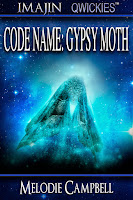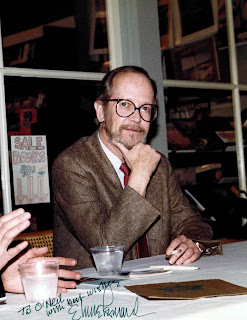by Thomas Pluck
 |
Thomas Pluck
|
Last night I attended a reading at the local Red Eye Cafe in Montclair, organized by Apryl Lee of Halfway There NJ. Poet Traci Brimhall, novelist Joan Silber, and short story writer Kem Joy Ukwu read from their latest works, and it was a good evening, except for when this old professorial dude accidentally spilled his hot coffee on me and Watchung Booksellers' stash of books for sale, because he was too stubborn to use the coat rack. I've hosted and read at dozens of Noir at the Bar events full of liquored-up writers and readers and never had a drink spilled on me, or thrown at me, even when I read "that gun story" in D.C. (it's called "Gunplay", and satirizes the American love affair with firearms, and you can read it in
Life During Wartime).
So, coffee shops are more dangerous for writers than bars. I'd write at McSorley's every night if I could. Only thing in danger would be my liver, and perhaps my skill at revisions.
At the Q&A after the readings, one of the audience asked about when the writers knew when they were done revising, and if they still wrestled with doubt. And of course they wrestled with doubt. Silber said that doubt was a good sign, when you are cocksure about your work, it is usually a sign that you haven't revised it with a critical eye. Or as Joyce Carol Oates might say, you aren't writing daring enough, if you aren't concerned about how it will be received. The newer writers, Brimhall and Ukwu, both admitted that they could revise until the end of time, and even confessed to editing as they read their stories aloud!
And yes, I've done that as well. Revised on the fly when a line didn't parse well. And that's after giving it a read at home before an event, and editing with a pencil to make the words flow better. We're always trying to improve our work. Writers are much more likely to pick up an old story and grimace than marvel at its genius, though sometimes you do get a surprise and think, "
I wrote that?Damn. Not bad." I'm relatively young and have only been writing regularly for about eight years--I wrote from adolescence until a few years after college, then stopped until 2010--so my experience is limited. While my voices have changed little--I have a couple of them--I'm happy to say that I have improved somewhat, and learned a lot from listening to other writers, editors, readers, and copy-editors.
That's an important lesson. If you think of editors as your enemy, you're going to have a rough time. I was privileged and fortunate to make friends with some solid editors who helped me with my earliest stories. And some of my latest. Matt Funk was one of them, he helped me with edits on "Gumbo Weather," which made it into Bouchercon's
Blood on the Bayou anthology. Jimmy Callaway helped with "Lefty." Holly West, Lynn Beighley, and Elizabeth Kracht all helped with
Bad Boy Boogie and then Chris Rhatigan edited it again after Down & Out Books accepted it. It ends when you have the best possible story within whatever constraints of time are set. Which is one reason that some writers only finish a book every seven or twenty years. Everyone works differently. Walter Mosley and Johnny Shaw both admit to dozens of drafts, and Mosley is prolific as hell. He just puts the time in until the book is what he wants it to be.
But how do you get better at revising your own work? I can't answer that for you. I can only say what helped me. I'm still learning. But an easy one is
read your work aloud. You don't need an audience. You'll find the clumsy sentences and superfluous lines. Typos pop out, too (best way to catch all those "from" / "form" mishaps and the like). And your inordinate fondness for annoying dialogue tags, using the same word multiple times per paragraph until it seems like a fetish... those are easily corrected. You'll learn just how often your characters grin, nod, snort, shrug, and communicate with their eyebrows like they are conducting an orchestra using only their foreheads.
The other "trick" that I've found applies to me is "start with chapter three." In my case, it is often "start with act 2." In a first draft, I start too early. You want to start as late as you can with as little backstory as possible, and salt that in later if it's absolutely necessary. Even in a literary story, if you want to write about how someone's childhood makes them freak out at the car dealership when the salesperson pulls the old undercoat scam, you don't start with when her mother was teaching her to drive, and when she swerved to avoid a deer, mom stomped so hard on the rusty passenger floor well that her foot went through and broke her ankle. You start at the dealership, among the cars, peering under the frame and saying she dropped her phone when the pushy salesman asks why she's on the pavement.
There was a lot less action in the beginning of the previous draft of
Bad Boy Boogie. It always began with him walking out of prison, but the hired muscle didn't show up until Act 2. I wanted Jay to "avoid the call" like in a James Campbell myth, but that didn't fit. He had to want something, and feel wronged. That's why we commit violence, after all. So he immediately heads to Tony's--after some Rutt's Hut hot dogs, to sate the appetite he built up clobbering the operators--and demands his birthright, the Hammerhead, the '71 Challenger they worked on in high school. And we not only see that he is dangerous as hell, taking out two armed veterans, but that no matter how much he hates bullies, he can be a bit of one himself, which sets up the internal struggle of the novel versus the external one, which is
do right by me.
That's a lot to keep in your head at one time. I joked online when a writer complained about how hard it was to keep all the structure of a novel in his head: That's why we write them down.
It's true. Homer may have been able to recite
The Odyssey at will, but ask a writer what she did to the protagonist in her third novel and she may look like a deer in the headlights. (Yes, the same deer that she almost hit on her first driving lesson, above). I make extensive use of temporary, very descriptive chapter headings, and occasional Post-It note outlines on a big piece of foam board, to keep track. I am very thankful that Scrivener has a strong search function that highlights all the chapters with a character's name, or how many times Jay calls someone "shitbird". It really helps. But you don't need a laptop or apps to write. Pen and paper still works, and you can write little 3"x5" cards with notes, tag pages with different color Post-Its, or simply scribble in the margins for notes. I know one writer with a couple novels published and dozens of stories, all written on his iPhone during breaks from work. Many writers swear by writing in longhand and editing as they type it up. You need to find what works for you. George Pelecanos writes for four hours in the morning and edits what he wrote every night. Others write at night, sleep on it, and edit it in the morning before they plunge on to the next chapters.
But how do you know what needs revision?
Well, that's a skill you pick up by reading. I mentioned the editors who sent me great notes. Those stick with you. If you find yourself critical of stories and books that you read, you have to learn to turn that eye on yourself, Dr. Lecter. It's difficult to be objective about your own work, but the usual advice is to sit on a story for a month or two, until you have the proper perspective. Meaning you look at it like something other than "
the greatest story I have ever written or that can ever be written, that will make me rich enough to hire James Patterson to write for me."
Because that can be a thing. Enthusiasm is great, it can be infectious. Sometimes you need it to blast out a certain story. One that I wrote for Holly West's upcoming Go-Go's themed anthology is from the perspective of a sixteen year old high school girl, and I wrote it not long after four high school graduates crashed at our apartment. I remembered how they interacted, some of the slang they used, what they talked about. I wrote that story mostly in a hotel room in New Orleans with the flu, instead of going to a wedding. Fireworks were going off over the Mississippi for the city's 300th anniversary celebration, I was learning that even room service food in New Orleans is better than most food anywhere else, and I had the idea for my story, so I stayed up chugging Mucinex and taking Tamiflu and made the best of Flu Orleans.
And I edited the hell out of it later when I got home and wasn't sick. It was pretty clean, but I made it less confusing, cut out the tangents, and tightened up the jokes. Holly loved it. And I am grateful. A tougher edit was for a story for Down & Out Magazine, edited by Rick Ollerman. He is a tough editor, but he knows how to write a damn good story, and how to improve yours. I wanted to write something original for the first issue of Down & Out, because I was excited. But I was also in the middle of a novel. I had an idea I'd been kicking around that was for a flash story, and figured I could stretch it out. I didn't edit it as strongly as I should have, and Rick made that clear. He caught a bunch of sloppy writing and helped me clean it up. Now it's one of my favorite stories, and we got a lot of great feedback about it when the magazine dropped. And I have some even better news that I will save for later, but Rick helped make that one striking story.
It can be tougher when you get rejections and don't know why. But that's another story. If you can be professional and polite, you can always ask. But be warned, editors are used to getting hate mail for rejections, so mind your tone. I wouldn't ask unless it gets rejected by multiple markets, or the market you are sure is perfect for it--because you
read every issue, don't you?--because sometimes the answer is "it just didn't grab me." A good story won't sell everywhere. The flip side to editing is the old "writer's curse." When you can't read for pleasure because you find yourself picking the book apart. I find most of that to be personal, projecting your own anger at the tough work of editing your own writing onto others. "This book isn't that great! I would've done
this! and they overuse the word 'murmur'!" Sure, it may have been improved by another edit, and I've read plenty of published novels that would have, but sometimes you have to understand that it's the best book they could come up with, and forgive their trespasses. And your own. Writing is a skill
and an art. You may have natural artistic ability, but skills are improved upon with hard work and experience. Which means failing sometimes. And it happens to all of us.












































